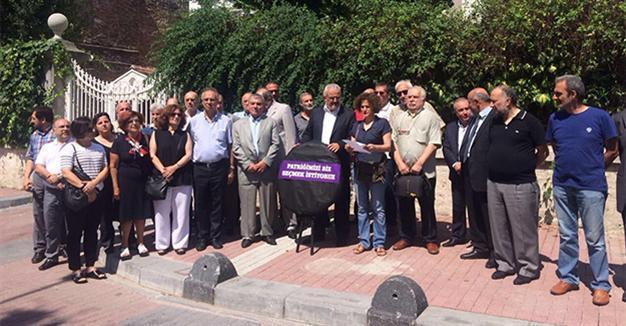Turkey’s Armenians demand right to replace acting patriarch
ISTANBUL

AA photo
A group of Turkish Armenians laid a black wreath in front of the Armenian Patriarchate to protest against being denied the right to replace acting Patriarch Aram Ateşyan, who was appointed to the post by the state eight years ago when Archbishop Mesrob II Mutafyan had to withdraw due to illness.“For exactly eight years, we [have not been able to] choose our patriarch due for various excuses. They are stalling the process with a made up, unheard of title,” writer Jaklin Çelik said on behalf of the group on June 22, defining the ongoing process as a fait accompli.
Çelik underlined that the seat of the patriarch was a 550-year-old tradition, representing the “existence and honor” of a nation whose roots go back some 3,000 years.
Mesrob II had to withdraw from his position in 2008 due to a deteriorating health condition, diagnosed as frontotemporal dementia (FTD). His seat remained vacant for two years as the Armenian community had an internal disagreement over how to proceed with the elections. Finally, in 2010 current acting patriarch Ateşyan was hastily appointed to the position through a letter from the Istanbul Governor’s Office.
Following Çelik’s remarks, the group laid a black wreath bearing the inscription “We want to choose our patriarch” in front of the Patriarchate in Istanbul’s Kumkapı neighborhood.
Speaking to state-run Anadolu Agency, Tatyos Bebek from the Turkish Armenian community’s Thought Platform, called on the Turkish state to “fulfill its promises” by permitting an election.
Bebek said former Prime Minister Ahmet Davutoğlu had promised to allow an election if the community got a report proving the incapacity of Mesrob II, during a meeting with minority representatives.
“We swiftly got a report from court, designating the patriarch’s mental faculties were inadequate for management. However, the state did not fulfill its promise,” Bebek said, adding that the seat of the patriarch remained vacant in their eyes, as Ateşyan’s title as general proxy is non-existent in Armenian traditions.
“The state created this [title] and chose a proxy within a date – an appointed one, to be exact. We want to choose our own patriarch. And we want the state to keep its promise,” Bebek added.
Meanwhile, Turkish-Armenian weekly Agos cited reports that such a protest against the patriarchate had not been reported for at least 50 years. Agos reported the final straw was Ateşyan’s letter to President Recep Tayyip Erdoğan, wherein he criticized a recent decision by the German Bundestag recognizing the World War I-era killings of Anatolian Armenians at the hands of the Ottoman Empire as “genocide.”
In his letter, Ateşyan said that the painful history of the Armenian people was being utilized as a tool to “blame and punish the Turkish nation and Turkey in the international political arena,” calling on all to understand the “use of the Armenian nation by imperialist powers.”
“It is ethically disputable to gloss over the role of the German Empire on this tragic incident while not only blaming Ottoman Turkey but also declaring it solely responsible,” he added, warning against breaking apart “two old and neighbor peoples” through a language of hatred and enmity.
The acting patriarch’s letter sparked outrage from segments of the Turkish Armenian community, as Agos published a letter addressed to the religious leader, inviting him to “common sense.”
“Accept this letter as the voice of those who are part of the [Turkish Armenian] community who do not agree with the content and the tone of your opinions,” the weekly said, claiming the acting patriarch’s use of the official discourse in defining the killings was an “insult to the ancestors, the victims and the survivors.”
















